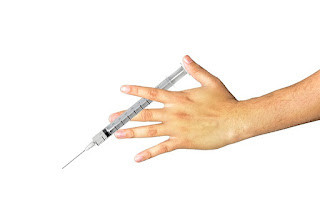Diphtheria is a bacterial infection of the nose and throat. Although it doesn't always cause symptoms, this disease is usually marked by the appearance of a gray membrane that lines the throat and tonsils.
 |
| Diphtheria, Causes, Diagnosis, Treatment, Prevention, Complications |
Diphtheria is classified as a dangerous infectious disease and has a life-threatening risk. If left untreated, the bacteria that cause diphtheria can release toxins that damage the heart, kidneys or brain.
Diphtheria can be prevented through immunization. In Indonesia, diphtheria vaccine is given in combination with pertussis (whooping cough) and tetanus, or also known as DPT immunization.
Causes and Risk Factors for Diphtheria
Diphtheria is caused by the bacterium Corynebacterium diphtheria, which can be spread from person to person. A person can be infected with diphtheria if they accidentally inhale or swallow the splashes of saliva released by the sufferer when they cough or sneeze.
Transmission can also occur if you touch objects that have been contaminated with the patient's saliva, such as glasses or spoons.
Anyone can experience diphtheria. However, the risk of developing diphtheria will be higher in people who do not get the complete diphtheria vaccine. In addition, diphtheria is also more at risk for people who:
- Living in a densely populated or unsanitary area
- Traveling to an area where there is an ongoing diphtheria outbreak
- Have a weak immune system, for example due to AIDS
Diphtheria Symptoms
Diphtheria symptoms appear 2 to 5 days after a person is infected. However, not everyone who is infected with diphtheria experiences symptoms. When symptoms appear, it is usually in the form of a thin, gray layer that covers the throat and tonsils of the sufferer.
Apart from the gray coating in the throat, other symptoms that can appear include:
- Sore throat
- Hoarseness
- Cough
- Have a cold
- Fever
- shivers
- Weak
- A lump appears in the neck due to swollen lymph nodes
When to see a doctor
Check with your doctor if you experience the symptoms of diphtheria above, especially if you have a risk of contracting it.
Immediately go to the hospital emergency room to get medical help if more severe symptoms of diphtheria appear, such as:
- Impaired vision
- A cold sweat
- Hard to breathe
- Heart beat
- Pale or blue skin
Diphtheria Diagnosis
Doctors can suspect a patient has diphtheria if there is a gray coating on the throat or tonsils. However, to be sure, the doctor will do a swab or throat swab.
Throat swab examination is carried out by taking a sample of mucus from the patient's throat, to then be examined in the laboratory.
Diphtheria Treatment
Diphtheria is classified as a serious disease and must be treated as soon as possible. According to statistical data, 1 out of 10 diphtheria patients dies despite receiving treatment.
Several types of treatment are used to treat diphtheria, including:
Antivenom injection
The doctor will give diphtheria antitoxin injections to fight the toxins produced by diphtheria bacteria. Before the injection is carried out, the patient will undergo a skin allergy test to ensure that there is no allergy to the antitoxin.
Antibiotics
The doctor will give antibiotics, such as penicillin or erythromycin, to kill the diphtheria bacteria and treat the infection. Keep in mind, antibiotics must be consumed until they run out according to a doctor's prescription, to ensure that the body is free from diphtheria.
Two days after giving antibiotics, generally the patient is no longer able to transmit diphtheria.
Treatment of diphtheria is carried out in an isolation room at the hospital, in order to prevent transmission of this disease to other people. If needed, the doctor will also prescribe antibiotics for the patient's family.
For patients who experience shortness of breath due to a membrane in the throat that blocks airflow, the doctor will install a breathing apparatus.
Diphtheria complications
The bacteria that cause diphtheria produce toxins that can damage the tissues in the nose and throat, blocking the respiratory tract. The poison can also spread through the bloodstream and attack various organs.
Complications that can occur include:
- Inflammation of the heart muscle (myocarditis)
- Pneumonia or lung infection
- Kidney failure
- Nerve damage
- Paralysis
Diphtheria Prevention
Diphtheria can be prevented by taking the following steps:
- DPT immunization
Make sure the child receives the DPT immunization, which is the administration of the diphtheria vaccine combined with the tetanus and whooping cough (pertussis) vaccines. DPT immunization is one of the mandatory immunizations in Indonesia which is given at the age of 2, 3, 4, and 18 months, as well as the age of 5 years.
- Consult with a doctor
Consult a doctor if your child has not received the DPT vaccine, especially if they are over 7 years old. The doctor will give the Tdap vaccine.
- Antibiotics
In addition to dealing with diphtheria, antibiotics can also be given to people who are in close contact with sufferers as prevention.
Related Searches:
- what is diphtheria,
- diphtheria symptoms,
- diphtheria vaccine,
- diphtheria definition,
- tetanus diphtheria,
- pharyngeal diphtheria,
- diphtheria treatment,
- diphtheria treatments,
- cutaneous diphtheria,
- diphtheria pronunciation,
- diphtheria toxin,
- diphtheria pseudomembrane,
- diphtheria causes,
- diphtheria is caused by,
- diphtheria tetanus pertussis,
- diphtheria vaccine history,
- diphtheria precautions,
- diphtheria pertussis tetanus,
- pharyngeal diphtheria precautions,
- c diphtheria,
- diphtheria is to disease as chicken is to,
- diphtheria antitoxin,
- diphtheria throat,
- definition diphtheria,
- what's diphtheria,
- diphtheria disease,
- tetanus diphtheria pertussis,
- diphtheria in calves,
- calf diphtheria,
- tetanus and diphtheria,
- diphtheria toxoid,
- diphtheria pictures,
- tetanus diphtheria vaccine,
- what cause diphtheria,
- symptoms of diphtheria,
- diphtheria tonsils,
- diphtheria shot,
- expression of diphtheria toxin by c. diphtheria is repressed in response to high iron levels.,


